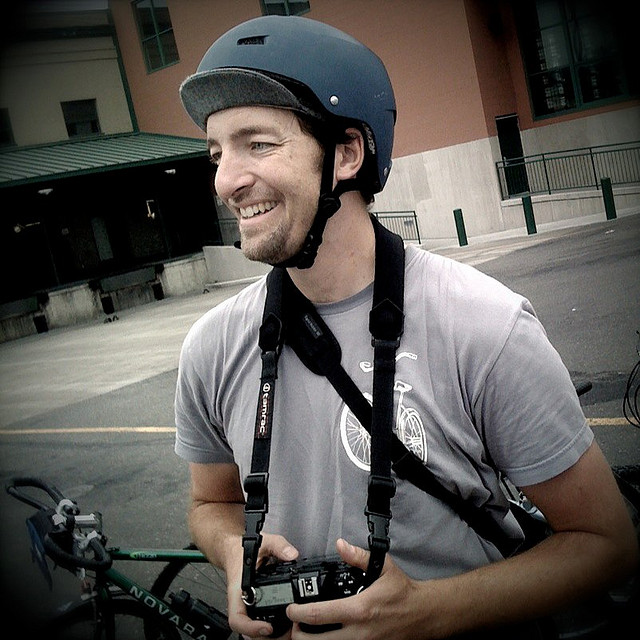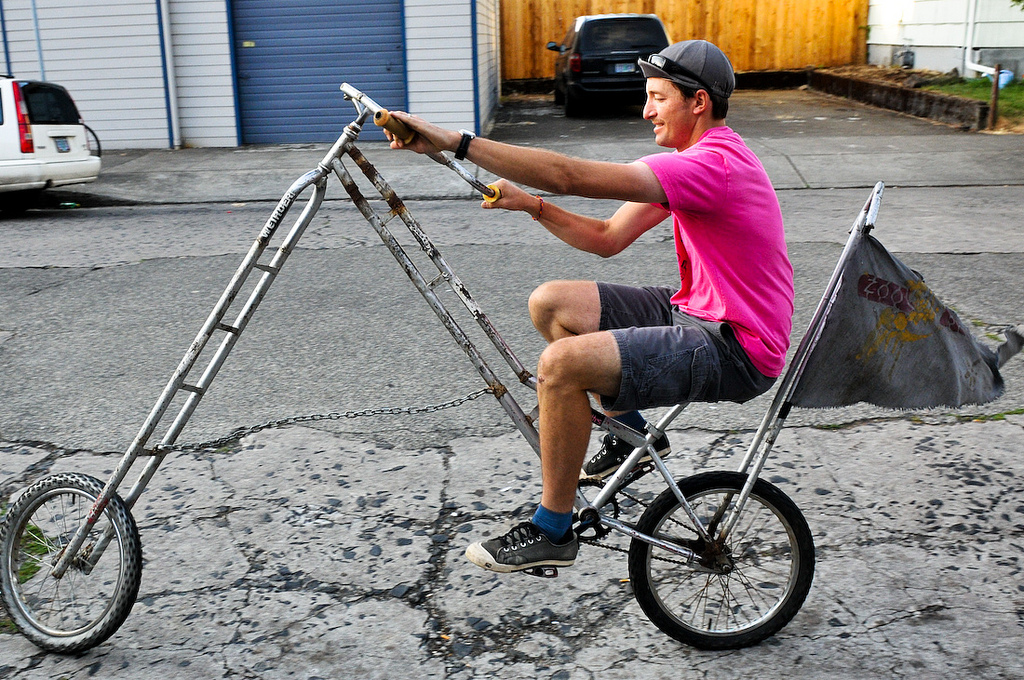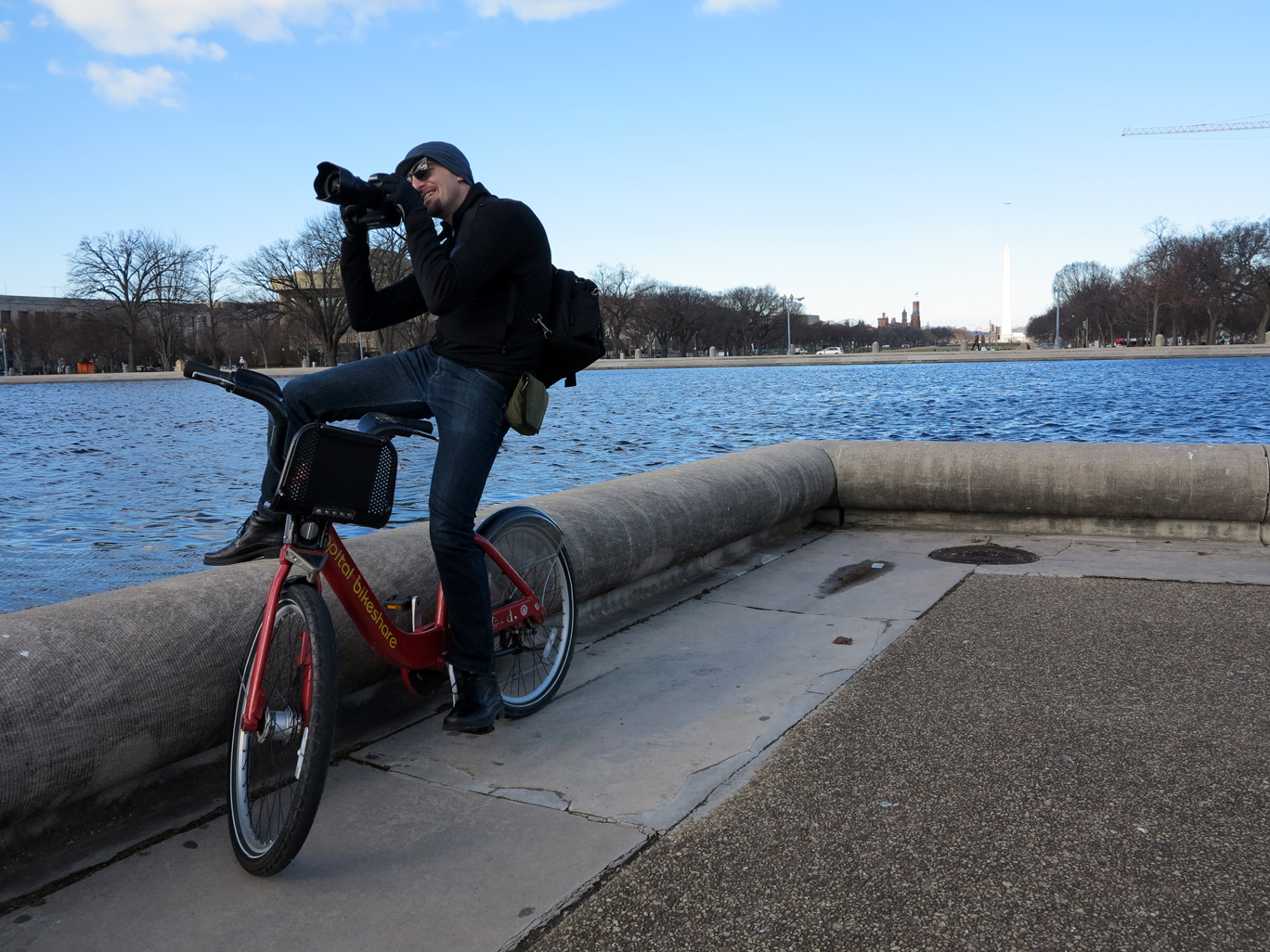
Jonathan Maus. Photo from flickr user scottrolfson.
For those of you at all tuned into bike advocacy in the United States, Jonathan Maus needs no introduction. Founder, editor, publisher and primary content creator at BikePortland, Jonathan’s been covering all things Portland, Oregon bike community for nearly 10 years. Depending on who you ask, he is the gold standard of bike advocacy reporting or a firebrand in the movement. The truth is, of course, a whole lot more nuanced. In this interview, Jonathan discusses his struggle to find that balance between advocate and journalist, the origins of BikePortland, the growth of bicycling in his city, and much more.
 What was your life pre-BikePortland?
Before BikePortland my life was, well, simpler and less stressful. I only had one child at the time and she was just two years old. Now that child is 10 years old and she has a sister (7) and a brother (2)! As for work pre-BikePortland, I was growing my marketing and media relations business. I used to work with businesses, entrepreneurs, authors, and so on to help market themselves better, get publicity in magazines, TV, and basically help them figure out their stories and how to tell them in a compelling way. It’s funny because I was the annoying PR guy hassling editors and writers to feature my clients — now I’m the guy who gets hassled by PR people. It’s been interesting, not to mention very enlightening, to be on the other side of that media relationship.

Photo from bikeportland.org flickr.
How did you end up in Portland and what inspired you to launch your site?
My wife Juli and I wanted to live in a community where middle-class families could survive, own a home, and feel like we were part of a neighborhood. That was not possible in Santa Barbara, California (one of the most expensive places to live in America). We had some college friends that had moved to Portland and had visited a few times. We decided it would be right for us, we flew up here one weekend, looked at a bunch of houses, made an offer, and up we came.
I was inspired to launch the site simply because of the amazing people and things going on around bicycling up here. I knew it was special and I wanted to share it with the world. I was also really intrigued by how the Internet and blogs were changing the media and marketing world. Once I got a taste of blogging about the local bike scene (thanks to an invitation to do it on The Oregonian’s website) I was hooked and it just sort of took off. Three months after starting the “Bike Fun” blog on OregonLive.com I ended that partnership, purchased the BikePortland.org domain name, uploaded a free WordPress theme, kept writing every day, and never looked back.
How long did it take before you could support yourself and your family solely with Bike Portland?
I don’t recall the exact dates, but I do remember working my ass off for about two full years before I made any real money. The first year I could say I supported my family solely with BikePortland revenue (my wife does not work outside the home for money) was probably 2008 or so. Since then, revenue has increased each year. I am very grateful to companies who support the site and they are truly an important part of making BikePortland possible.
Bike Portland is a good example of advocacy journalism. How do you balance journalistic objectivity with your desire to advance bike advocacy? Do you consider yourself an advocate or a journalist first?
That’s the 64 million dollar question. And the answer is very complicated. Balance, whether it’s the work/life balance or the advocacy/journalism balance, is the hardest thing about this job. As for advocacy/journalism, I still haven’t completely figured it out. Last week I went through the toughest week of my life on the site. Much of it was caused by getting too involved emotionally in a story, which led me to make a bad journalistic decision. Then the decision was compounded by the fact that people of color were involved in the story and I wasn’t sensitive enough to use extra caution. When the story went bad and public criticism started coming in, I got defensive when I shouldn’t have (I was still too attached to the story to think clearly), and my defensiveness only made things worse. It was very humbling and educational experience on many levels and it has forced me to reassess, once again, the question about what I am and how I can do it most effectively.
In the end, I am an advocate first and a journalist second. I have struggled to define my relationship to those two roles for many years, but the events of last week clarified for me that I care more about community building and pushing bicycling forward than I do about being a traditional journalist in the mold of newspaper reporters.
Another tough thing about my role is that many people involved in the “bike movement” — which includes advocates, city bureaucrats, and politicians — see me as being “part of the team.” So, when I take a critical eye to something, or question something “the team” does (or wants to do), it is sometimes met with anger, frustration, fear, or all of the above. I have a lot of experience managing this dynamic but it’s still always a difficult balance. It takes time to build up trust and respect from people who are simultaneously friends/acquaintances, fellow advocates working to move bicycling forward, and sources. It has been a rocky road an emotional roller coaster to say the least.
As for what I consider myself to be, my first instinct is to avoid any label and just let people think whatever they’d like. I realize my role in this community is unique and I don’t feel the need to define myself. I recently posted a photo of myself with Congressman Earl Blumenauer at the National Bike Summit and a local reporter thought it was crazy that I, as a self-described “independent journalist,” would share a photo of myself being “chummy” with such a powerful person. In many ways, that little moment with Blumenauer is symbolic of what I’ve tried to describe above.
In the end, I think my work and my record speaks for itself. I have this saying that “I am not a robot,” which is to say that I, like every other human being, have feelings and things I care about. So, when I type words about those things, it’s natural for those feelings to come through. I don’t prevent that from happening, but I’m aware of it and I choose my words very carefully (at least most of the time 😉 ). Â As you can tell by this verbose response, this whole advocacy/journalism thing is complicated and murky. But that’s OK. Simply because something is hard to define, doesn’t mean it’s a bad thing.

Jonathan in Washington DC. Photo by Joel Gwadz.
Portland is heralded as the best bike city in America, and deservedly so. Yet biking is still under 10 percent of the mode share. Do you think bike ridership can ever equal that of transit or car use? What will it take to make that happen?
The numbers are misleading. It’s important to look at the central city/downtown mode split numbers instead of the citywide numbers. When you do that, bike use is comfortably in the teens and from some neighborhoods over 20% of commuters take a bike to work (And yes, that’s only close-in neighborhoods, we’ve got to see those numbers spread to all corners of the city). That being said, transit and driving are still tops; but not for long! Biking will very soon surpass transit in mode share. I won’t be surprised if in 10 years more people bike than drive alone. It’s simple math. We can’t continue to grow and handle traffic with the current mix of users. We also can’t continue to fund transit and auto-centric projects like we used to. That will leave bicycling as the last mode standing — and it also happens to have the best ROI of any mode (including walking!).
It’s obvious what it takes to grow bike usage rates. Discourage and regulate auto use (through policy and road design) and make the streets more efficient and pleasant to bike on. On a bus or rail car or in an automobile, I’m assured a safe journey pretty much door-to-door. However on a bike there are many gaps in the system where I face real safety risks. If bike access was respected and served at the same level as transit and driving a car — and I believe it should be — I have no doubt we’d see a massive spike in bicycling rates.
It seems like there’s constantly a next big thing in advocacy–family biking, cycle chic, bike tourism, etc. What do you think the next trend will be?
Well, it was clear from this year’s National Bike Summit that the next big thing — that’s already happening in a big way — is broadening the conversation about bicycling to include women, people of color, and all groups that have not been at the table around bicycle policy and activism historically. That shift has huge consequences. It will not only make the case for bicycling even stronger (who in their right mind could be against something that is loved by such a diverse swath of the American public?), but it will also lead to a greater focus on fashion, separated facilities, bottom-up policymaking, and so on. That’s because as the face of bicycle advocacy leaders change, the issues they represent will become more powerful and influential.
Obviously there’s no silver bullet trend or movement in advocacy, but what would you like to see in the coming years from advocates around the US to help increase and improve biking as transportation?
Stop marginalizing yourself by using unnecessary labels. It pains me whenever I heard the League of American Bicyclists or other advocacy groups proclaim “We are bicyclists!” It’s time to stop allowing ourselves to be so conveniently defined, stereotyped, and scapegoated. It’s awesome to celebrate your love of bicycling, but don’t make it seem like we’re all on the “same team” or that we somehow all act in unison and have the same beliefs. Biking has matured to the point where people do it for many different reasons and they advocate for it in many different ways. And that’s OK. It’s hard for advocacy groups to break away from this self-labeling cycle because they rely on a strong “bicyclist” identification in order to drive memberships, but shedding exclusive labels wherever possible is imperative for us to reach beyond the usual suspects and ultimately make bicycling attractive to a broader swath of the population.

3 Responses to Jonathan Maus: Bike Advocacy, Journalism, and the Struggle for Balance